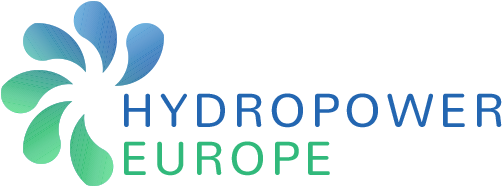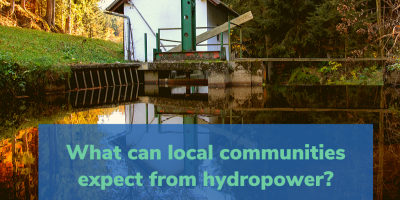Press Releases
Experts opinion: What can local communities expect from hydropower?
A series of articles presents experts opinion on the current issues of the hydropower sector. To begin with, HYDROPOWER EUROPE introduces you to the topic of involvement of the local communities. No one doubts hydropower's green credentials, but to gain acceptance it must bring direct benefits for local people. Prof. Dr. Anton J. SCHLEISS and Dr. Jean-Jacques FRY bring the light into the benefits and disadvantages of hydropower for the local communities.
Hydropower development plays an increasing role of mitigation of global warming impacts, thanks to water availability, drought and flood control or conservation of freshwater habitats which provide resources and useful services to local communities, Jean-Jacques argues. The increase of the existing storage as well as the construction of new reservoirs ensures high flexibility which is not only required for safe electricity supply in Europe but it also the mitigates locally the effects of climate change as droughts and floods, Anton adds.
Why is hydropower advantageous for us?
Hydropower is unique amongst other renewables as besides electricity generation, providing positive externalities for local communities like additional social-economic benefits such as flood and drought protection, water supply, irrigation, navigation, river crossing, recreation, etc.
A large number of reservoirs operators have experience in managing water in a multi-purpose way. Benefits for the local communities provided by multipurpose reservoir can improve public acceptance to a new hydroelectric project. Involvement of these local communities is the primary condition for the deployment of hydropower. Dams boost regional development creating jobs and providing non-electricity related facilities such as transportation infrastructures and leisure attractions, etc.
Hydropower schemes can provide funds to preserve cultural heritage and reservoirs provide good sightseeing and tourism attraction.
What are the possible disadvantages?
As a major weakness, Jean-Jacques sees that there is not enough communication between stakeholders and description of non-electricity values of hydropower for the public in the times when the development of hydropower is stopped and movement of dam removal is getting stronger. Hydropower is perceived only as an industry or business and not as a service to the community without evaluation and recognition of its benefits.
Public and government are taking additional benefits of hydropower for free without a clear allocation of cost and benefit or without any additional incentive for hydropower plants owners. On the contrary, incentives from governments are getting lesser and it is difficult to rely only on electricity sales. For example, in Estonia, a number of small hydropower plants were decommissioned due to high environmental requirements.
A multipurpose reservoir may have an impact on profitability and results in more expensive energy production. Hydropower, not strictly responsible for water use, has to share its assets with all the stakeholders and cannot optimize the use of reservoir for power generation. This situation may induce conflict of interest between stakeholders and in some cases to lead to maximal demands.
About the authors
With more than 40 years of experience, Prof. Dr. Anton J. SCHLEISS is regularly involved as a consultant and expert in large water infrastructures projects including hydropower and dams all over the world.
Worked for 37 years for one of Europe's largest hydropower utilities, EDF, Dr. Jean-Jacques FRY has participated in numerous studies of hydroelectric projects with expertise mainly in structures and more particularly dams and geotechnical problems of structures.
Latest News
EVENT: Developments and biodiversity of watercourses. 8-10 November 2022
"Aménagements et biodiversité des cours d’eau" (EN: "Developments and Biodiversity of watercourses") is a conference organised by the Societé Hydrotechnique de France (SHF), next 8-10 November 2022 in Strasbourg, France. About the confere...
CONFERENCE: "QUO VADIS? Innovation potential of Hydropower" 27 - 28 October 2022
"QUO VADIS? Innovationspotential der Wasserkraft" (Innovation potential of Hydropower) is a conference organised by IBI- Kompetenz, the multidisciplinary platform for e...
JOINT LETTER: Renewables displace fossil fuels - the Innovation Fund must recorgnise this
Joint letter signed by: Bioenergy Europe, the European Heat Pump Assocition (EHPA), the European Renewable Energies Federation (EREF), the European Solar manufacturing Council (ESMC), the European Solar Thermal Electricity Association (ESTELA), Solar Heat Europe (ESTIF), Solar Power Europe, the A...
ETIP HYDROPOWER EUROPE: The permanent and common voice of Hydropower in Europe
ETIP Hydropower Europe (ETIP Hydropower) is a new project in the EU programme ...
Prof. Anton Schleiss at the 7th IAHR Europe Congress (Greece)
Prof. Anton Schleiss, from the International Commission on Large Dams (ICOLD - CIGB), was invited as a keynote speaker for the opening session og the ...
Hydro Power Industry Guide 2021/22 by VGBE
After the success from "Hydro Power Industry guide 2020/21", our colleagues from VGBe wanted to offer us the new guide from this year: “Hydropower Industry Guide 2021/22”. vgbe´s ...
POSITION PAPER: Hydropower as a catalyst and facilitator for the clean, safe and independent energy transition in Europe.
Key Messages: Given Europe’s ambition to raise the renewables target to 45%1 hydropower is critical to ensure Europe’s energy system has the necessary renewable electricity and flexibility to protect grid stability from intermittent renewable energy, to sustain the gr...
NEW PUBLICATION, Hydroscience Journal: "Hydropower, a catalyst for energy transition in Europe"
On the context of HydroES 2021 (22 September 2021), Hydropower Europe had the chance to present its vision and results achieved during three years of consultations. Some of the conclusions are: Hydropower still has a great potential for development Hydropower sector needs...
HYDRO 2022 Strasbourg: How to promote future hydro development in Europe with a sustainable impact?
The HYDROPOWER EUROPE project (2018-2022), funded from the European Union's Horizon 2020 research and innovation program, has released its final deliverables: a Research and Innovation Agenda (RIA) and a Strategic Industry Roadmap (SIR) for the hydropower sector. The challenge is...
Webinar 28 february 2022: What Research and Innovation are Needed to Tap More Hidden Hydro Opportunities in the Future?
The IEA Technology Cooperation Programme (TCP) on Hydropower (also known as IEA Hydro) is a working group of the International Energy Agency's member countries and others that have a common interest in advancing hydropower worldwide. Under the work programme Annex XVI...





